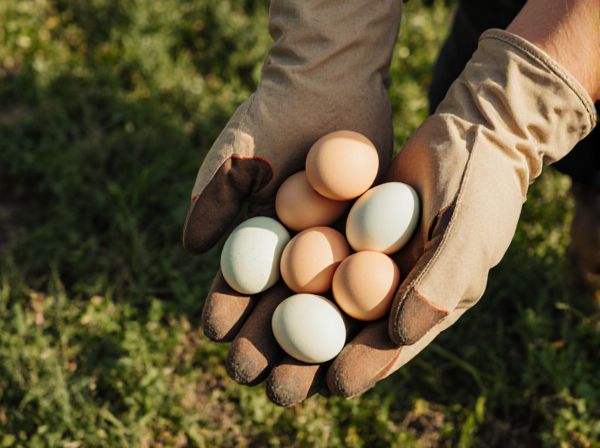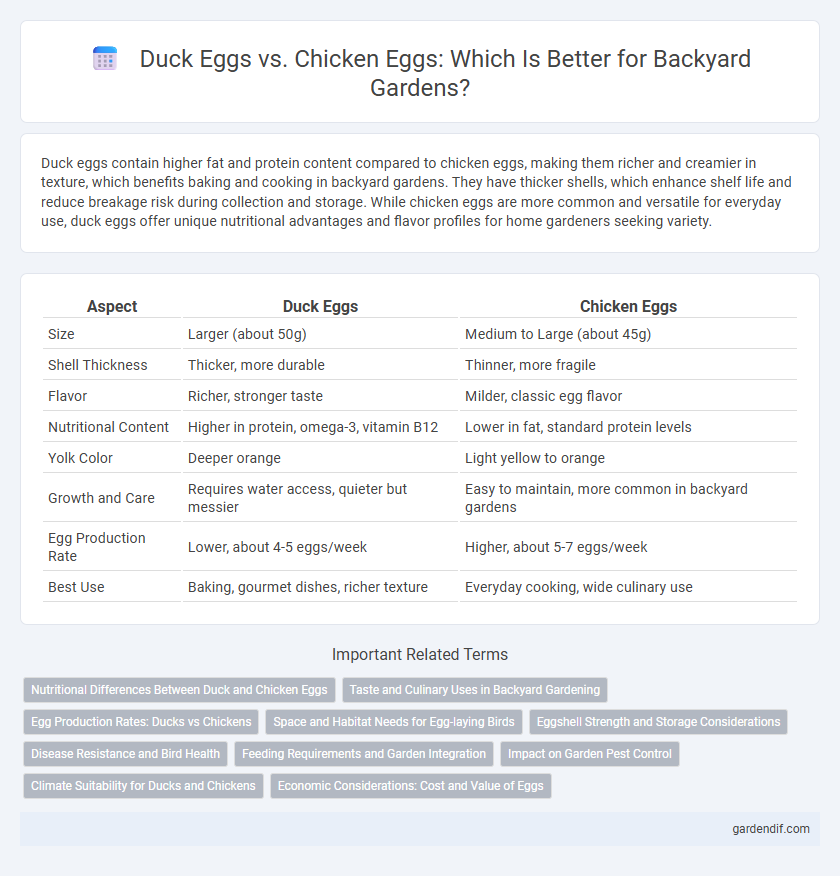
Duck eggs vs Chicken eggs (in backyard gardens) Illustration
Duck eggs contain higher fat and protein content compared to chicken eggs, making them richer and creamier in texture, which benefits baking and cooking in backyard gardens. They have thicker shells, which enhance shelf life and reduce breakage risk during collection and storage. While chicken eggs are more common and versatile for everyday use, duck eggs offer unique nutritional advantages and flavor profiles for home gardeners seeking variety.
Table of Comparison
| Aspect | Duck Eggs | Chicken Eggs |
|---|---|---|
| Size | Larger (about 50g) | Medium to Large (about 45g) |
| Shell Thickness | Thicker, more durable | Thinner, more fragile |
| Flavor | Richer, stronger taste | Milder, classic egg flavor |
| Nutritional Content | Higher in protein, omega-3, vitamin B12 | Lower in fat, standard protein levels |
| Yolk Color | Deeper orange | Light yellow to orange |
| Growth and Care | Requires water access, quieter but messier | Easy to maintain, more common in backyard gardens |
| Egg Production Rate | Lower, about 4-5 eggs/week | Higher, about 5-7 eggs/week |
| Best Use | Baking, gourmet dishes, richer texture | Everyday cooking, wide culinary use |
Nutritional Differences Between Duck and Chicken Eggs
Duck eggs contain higher levels of protein, omega-3 fatty acids, and vitamin B12 compared to chicken eggs, making them a nutrient-dense option for backyard garden enthusiasts. They also have increased amounts of iron, zinc, and vitamin D, which contribute to enhanced immune support and bone health. Chicken eggs offer fewer calories and fat, making them a lighter alternative with a slightly lower risk of cholesterol-related concerns.
Taste and Culinary Uses in Backyard Gardening
Duck eggs offer a richer, creamier taste and higher fat content compared to chicken eggs, enhancing baked goods and custards in backyard gardens. Their thicker shells make them ideal for extended storage, while their robust flavor suits savory dishes requiring a more pronounced egg taste. Chicken eggs provide a milder flavor and lighter texture, making them versatile for everyday cooking and simple garden-to-table recipes.
Egg Production Rates: Ducks vs Chickens
Duck eggs generally have a lower production rate compared to chickens, with most duck breeds laying around 3 to 4 eggs per week, while hens can produce 5 to 7 eggs weekly. Duck egg production often peaks in spring but may decrease in colder months, whereas chickens tend to maintain more consistent laying patterns year-round. Backyard gardeners should consider these differences when planning for egg supply, balancing quantity with the distinctive nutritional qualities of duck versus chicken eggs.
Space and Habitat Needs for Egg-laying Birds
Duck eggs require a larger nesting area compared to chicken eggs due to ducks' bigger body size and preference for secluded, water-adjacent habitats. Backyard gardeners must provide spacious, moisture-rich environments with deep bedding to accommodate ducks' natural behaviors and ensure optimal egg-laying conditions. Chickens thrive in drier, more compact coops with simple nesting boxes, making them more adaptable to limited outdoor spaces.
Eggshell Strength and Storage Considerations
Duck eggs have a thicker, sturdier eggshell compared to chicken eggs, making them less prone to cracking in backyard garden environments. Their robust shell enhances protection during handling and transportation, contributing to longer freshness and reduced spoilage. Proper storage of duck eggs in a cool, consistent temperature can extend their shelf life up to several weeks beyond that of chicken eggs, which are more sensitive to temperature fluctuations.
Disease Resistance and Bird Health
Duck eggs offer enhanced disease resistance compared to chicken eggs due to ducks' natural immunity to common poultry diseases such as avian influenza and coccidiosis, reducing the risk of outbreaks in backyard gardens. Ducks' hardier constitution supports overall bird health, requiring fewer antibiotics and less intervention, resulting in more sustainable egg production. Consequently, integrating ducks in backyard setups promotes resilient flocks with improved disease management relative to chickens.
Feeding Requirements and Garden Integration
Duck eggs require a higher protein diet and increased calcium intake compared to chicken eggs to support their larger size and shell strength. In backyard gardens, ducks forage for pests, helping to naturally control insects, while chickens excel at scratching the soil and aerating it, benefiting garden soil health. Integrating both species provides complementary ecological functions, enhancing nutrient cycling and reducing reliance on commercial feeds.
Impact on Garden Pest Control
Duck eggs contain higher protein levels than chicken eggs, making them a valuable food source for beneficial insects that naturally control garden pests. Incorporating duck eggs into backyard garden diets can improve the health of predatory insects and birds, enhancing pest regulation without chemical pesticides. Compared to chicken eggs, duck eggs provide a sustainable way to support a balanced ecosystem and reduce harmful pest populations in garden environments.
Climate Suitability for Ducks and Chickens
Duck eggs thrive in wetter, cooler climates as ducks tolerate damp conditions and cold weather better than chickens, making them ideal for backyard gardens in such regions. Chickens prefer drier, warmer environments and are more susceptible to heat stress and humidity, influencing their egg production and overall health. Selecting ducks for moist, temperate climates and chickens for warmer, arid areas optimizes egg yield and animal welfare in backyard setups.
Economic Considerations: Cost and Value of Eggs
Duck eggs generally cost more than chicken eggs due to their larger size and richer nutritional profile, making them a premium product in backyard gardens. Despite higher feed costs and longer incubation periods, duck eggs often offer greater value per egg for gourmet recipes and nutrient density. Backyard gardeners may find economic benefit in selling duck eggs at specialty markets, where their unique qualities command higher prices.
Duck eggs vs Chicken eggs (in backyard gardens) Infographic

 gardendif.com
gardendif.com